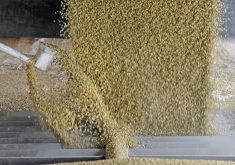HAMBURG, Germany (Reuters) — Chicago wheat futures rose on Monday after Russia said it was withdrawing from the agreement for a wartime safe shipping channel for Ukraine’s grain exports.
Corn and soybeans gained, following last week’s strength, with support from concerns over dry weather in the U.S. Midwest.
Chicago Board of Trade’s most active wheat, Cv1, rose 3.0 percent to $6.81-3/4 a bushel, earlier rising over four percent after Russia announced it was leaving the shipping deal.
Read Also

Heat waves combine sunshine and sinking air
As we continue our look at heat waves, I figured we should first define what they are by looking at the criteria Environment Canada uses to define heat events.
Soybeans Sv1 climbed 1.1 percent to $13.86-1/2 a bushel and corn Cv1 rose 1.4 percent to $5.21-1/4 a bushel.
“Wheat is rising after the news Russia is not extending the Ukrainian safe shipping agreement,” said Matt Ammermann, StoneX commodity risk manager.
“The price rises are relatively restrained and not showing market expectations of a crisis with general expectations that the channel would not be extended.”
Russia said on Monday that it had halted participation in a United Nations-brokered deal that allowed Ukrainian grain to be exported through the Black Sea just hours after Moscow said Ukraine had attacked the bridge to the Crimea. The Ukrainian shipping deal had been scheduled to expire later on Monday.
“Assessments are that there are sufficient wheat supplies to meet import demand, but prices could lower if the channel was working,” Ammermann said.
“Russia has large wheat supplies it is selling cheaply on the world market and EU crops are arriving. Ukraine is also exporting large volumes via EU ports especially in the Black Sea. Wheat import demand is currently weak.”
Concerns over dry weather in the U.S. Midwest supported corn and soybean futures. The U.S. corn crop is going through its key pollination phase and a lack of moisture could curb yields.
“Dryness and the heat wave in the U.S. Midwest and parts of Canada are supporting soybeans and corn, with concern about crop stress,” he added.















